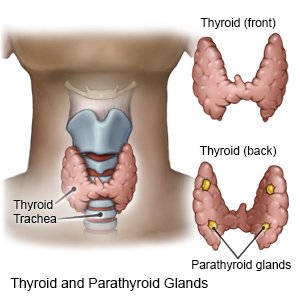Parathyroidectomy
Medically reviewed by Drugs.com. Last updated on Apr 6, 2025.
What do I need to know about a parathyroidectomy?
A parathyroidectomy is surgery to remove part or all of your parathyroid glands. You have 4 small parathyroid glands that are near the thyroid gland. The parathyroid glands make a hormone that controls the amount of calcium in your blood. You may need this surgery if one or more of your parathyroid glands produces too much hormone. This may be caused by a benign (not cancer) tumor.
 |
How do I prepare for a parathyroidectomy?
- Your healthcare provider will tell you how to prepare for surgery. You may be told not to eat or drink anything after midnight on the day of surgery. Your provider will tell you which medicines to take or not take on the day of surgery.
- Blood tests are used to check the amounts of calcium and thyroid hormone in your blood. You may be given antithyroid medicine to lower the amount of thyroid hormone made by your thyroid gland.
- A scan may be done right before your surgery to help healthcare providers know which parathyroid glands are overactive. Radioactive dye is put into your IV to help healthcare providers see your parathyroid glands and know which glands need to be removed. Healthcare providers will use a camera above your neck and chest to look for the parathyroid glands that absorbed the dye.
Drugs used to treat this and similar conditions
Sensipar
Sensipar reduces elevated levels of parathyroid hormone in people with chronic renal disease who ...
Zemplar
Zemplar (paricalcitol) is used to treat secondary hyperparathyroidism in people with chronic kidney ...
Omvoh
Omvoh is used to treat moderate to severe ulcerative colitis or Crohn's disease in adults. This ...
Rocaltrol
Rocaltrol is used for hypocalcemia, hypoparathyroidism, renal osteodystrophy, rickets, secondary ...
Doxercalciferol
Doxercalciferol systemic is used for secondary hyperparathyroidism
Paricalcitol
Paricalcitol systemic is used for secondary hyperparathyroidism
Cinacalcet
Cinacalcet systemic is used for hypercalcemia of malignancy, primary hyperparathyroidism, secondary ...
Calcitriol
Calcitriol systemic is used for hypocalcemia, hypoparathyroidism, renal osteodystrophy, rickets ...
What will happen during a parathyroidectomy?
- You may have an open parathyroidectomy. An incision will be made in your neck. A handheld probe (wand) and video may be used during the surgery to find your parathyroid glands. Your surgeon will remove part or all of your parathyroid glands. If all 4 glands need to be removed, your surgeon may leave a small part of 1 gland in place. He or she may also put a small piece of gland into a muscle in your arm.
- You may instead have a minimally invasive parathyroidectomy. Your surgeon will place a scope through small incisions on your neck, or chest and underarm. He or she may insert other tools in 1 to 2 smaller incisions at different places on your neck or armpit. He or she will then inject a gas (carbon dioxide) in the neck area near your parathyroid gland. This will lift the skin of your neck away from the parathyroid and allow your surgeon more space to work in. Clips, cautery, loops, or staples may be used to separate the gland from other structures near it. Blood tests may be done during surgery to check your parathyroid hormone level. The incisions will be closed with stitches or surgical glue and covered with bandages.
- A drain may be placed in your wound to remove blood or extra fluid from the surgery area. The wound will be closed with stitches or surgical glue and covered with bandages.
What will happen after a parathyroidectomy?
A healthcare provider will check your incision soon after your surgery to make sure everything is okay. If you have a drain, your healthcare provider will check it when he or she checks your incision. He or she will remove it when your incision stops draining fluid.
What are the risks of a parathyroidectomy?
During or after surgery, you may bleed more than expected, or get an infection. Your thyroid gland, blood vessels, or other tissues may be damaged during surgery. You may have nerve or vocal cord damage. You may have a hoarse or weak voice that lasts for a few days or longer. You may get a blood clot in your leg or arm. This can cause pain and swelling, and can become life-threatening. Your blood calcium level may be lower than normal after surgery. Your condition could return and you may need to have surgery again.
Care Agreement
You have the right to help plan your care. Learn about your health condition and how it may be treated. Discuss treatment options with your healthcare providers to decide what care you want to receive. You always have the right to refuse treatment. The above information is an educational aid only. It is not intended as medical advice for individual conditions or treatments. Talk to your doctor, nurse or pharmacist before following any medical regimen to see if it is safe and effective for you.© Copyright Merative 2025 Information is for End User's use only and may not be sold, redistributed or otherwise used for commercial purposes.
Further information
Always consult your healthcare provider to ensure the information displayed on this page applies to your personal circumstances.
